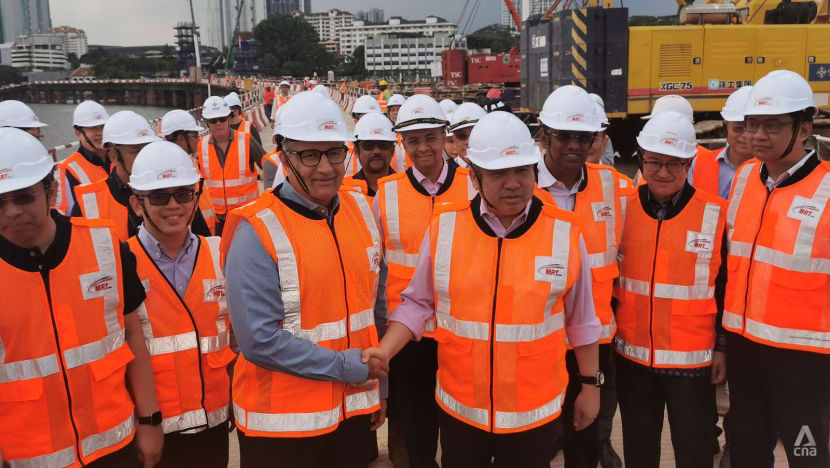Singapore-JB RTS Link on track to start operations by end-2026, construction at Singapore side hits halfway mark

Singapore Transport Minister S Iswaran (third from left) and his Malaysian counterpart Anthony Loke during a visit to the JB-Singapore RTS Link project marine viaduct. (Photo: CNA/Amir Yusof)
JOHOR BAHRU: The Johor Bahru-Singapore Rapid Transit System (RTS) Link project is on track to be completed by end-2026 and construction has reached the halfway mark on the Singapore side.
Speaking during a press conference in Johor Bahru on Thursday (May 11), Singapore’s Transport Minister S Iswaran said that construction on the Singapore side was around 50 per cent completed. His Malaysian counterpart Anthony Loke noted that the construction on the Malaysia side was around a third complete.
The pair spoke to reporters after a working visit to the RTS Link Project Marine Viaduct site in Johor Bahru to inspect the construction progress.
Mr Iswaran said: "Work on the Singapore side of the RTS Link is progressing well. And we have completed about 50 per cent of civil construction works for both the overall railway infrastructure and marine viaduct. In short, based on the progress that we have achieved on both sides, we expect to be ready on time for commencing passenger services by the end of 2026."
Mr Iswaran added that the next significant milestone for the project is when the "drop-in span bridge” connecting both sides of the viaduct will be completed.
He said that the next milestone event will be commemorated by the prime ministers of Singapore and Malaysia in early 2024.
Mr Loke said that Malaysia is confident of completing the project "in full" by December 2026 in accordance with the bilateral agreement signed between the two countries.
"As of Apr 30, the overall progress of the railway infrastructure (on the Malaysia side) has reached 36 per cent, which is one-third of the project. For the marine viaduct portion, where we are visiting today, the actual progress is 30 per cent," said Mr Loke.
"Malaysia remains fully committed to the delivery of RTS Link, working closely with Singapore,” he added.
The RTS Link aims to connect Bukit Chagar in Johor Bahru city to Woodlands in Singapore, serving about 10,000 passengers per hour each way to help ease traffic congestion on the Causeway.
RTS Link tunnels will connect to a viaduct 25m above the Straits of Johor, bridging the Woodlands North station in Singapore to the Bukit Chagar station in Johor Bahru.
The CIQ (customs, immigration, quarantine) facilities of both countries will be co-located at the Woodlands North and Bukit Chagar stations, which means passengers only need to clear immigration authorities once - at their point of departure.
The Johor Bahru-Singapore Rapid Transit System (RTS) Link project is on track to be completed by end-2026 and construction has reached the halfway mark on the Singapore side. Afifah Ariffin with more.
Following Thursday’s visit, Singapore's Ministry of Transport and Land Transport Authority (RTS) released a joint statement, highlighting that construction works at the RTS Link Woodlands North terminus site on the Singapore side were “on track”.
“Works have involved the use of high-capacity drilling machines, extended piling works and rock blasting techniques, to overcome challenges posed by the hard granite in the area,” the statement said.
It added that LTA has implemented “real-time instrumentation monitoring” and “rigorous surveys” to ensure that the vibrations generated during construction are within controlled limits, protect the structural safety of all surrounding infrastructure and minimise any inconvenience to the public.
“RTS Link Woodlands North station is part of the overall RTS Link development on the Singapore side, which will have a combined gross floor area approximately 10 times that of a typical MRT station,” the statement said.
The development encompasses the RTS Link Woodlands North station, which will be constructed at a maximum depth of 28 metres and connect commuters to the Thomson-East Coast Line (TEL) Woodlands North MRT station as well as a CIQ building, the statement added.
In March, Mr Iswaran said that 45 per cent of the work that needed to be done on the Singapore side had been completed. He also reiterated that the RTS was on track to be completed by end-2026.
The JB-Singapore RTS project was originally scheduled for completion in 2024, with the Malaysia and Singapore governments signing a bilateral agreement to build the link in 2018.
But the project was suspended a number of times after the Pakatan Harapan coalition government came to power in Malaysia in 2018.
The project officially resumed in July 2020, with a bilateral ceremony held on the Causeway to mark the occasion. Singapore Prime Minister Lee Hsien Loong and his then-Malaysian counterpart Muhyiddin Yassin were both in attendance.
The project is estimated to cost RM10 billion (S$3.25 billion), with Singapore bearing 61 per cent of the cost.
DISCUSSIONS ON POSSIBILITY OF REVIVING HSR
During the press conference on Thursday, the two transport ministers were also asked whether there has been progress in talks on reviving the Kuala Lumpur-Singapore High Speed Rail (HSR) project.
Mr Loke said: “We did discuss the way forward. And on behalf of the Malaysian government, I made it very clear that we are keen to revive the project.”
Mr Loke reiterated that that model of implementation must be based on a private sector-led initiative. “So we are open to suggestions and proposals from the private sector. And likewise, I think that we have to continue to engage each other and to further discuss the way forward on this particular project,” he said.
Mr Loke added that there were some companies that have expressed interest to lead the project.
"However, we have to review the execution model, the costs model and other factors. The principle has always been that the Malaysian government is keen for the project to be revived, but it must be fully financed by the private sector."
On his part, Mr Iswaran said that the two ministers had a good discussion and that HSR was one of the topics raised.
“I took the opportunity to underscore again Singapore's readiness to study any proposal from Malaysia on how the HSR project can be restarted,” said Mr Iswaran.
“So we remain open and we are ready to work with the Government of Malaysia to study any new proposal,” he added.
The HSR project, which aimed to reduce travel time between Singapore and Kuala Lumpur to about 90 minutes, was discontinued after multiple postponements at Malaysia's request and an eventual lapsing of an agreement in December 2020.
Malaysia paid more than S$102 million in compensation to Singapore for the terminated project.
The proposed line was supposed to have a stop at Iskandar Puteri, linking the Nusajaya region within Iskandar Malaysia to Singapore, Melaka, Seremban and Kuala Lumpur.
At end-2021, then prime minister Ismail Sabri Yaakob suggested reviving discussions on the HSR, even saying in August last year that he would like to see the HSR revived at the earliest opportunity - albeit with some route changes and the possibility of extending it northwards to Thailand and China.
Singapore Deputy Prime Minister Lawrence Wong said then that Singapore was open to fresh proposals from Malaysia on the HSR.
In January 2021, while he was the opposition leader, Prime Minister Anwar Ibrahim called the HSR cancellation a mistake “both from a current economic standpoint and in terms of future benefits”. Mr Anwar said that the project could have drawn in tourists, businesses as well as foreign direct investments.








